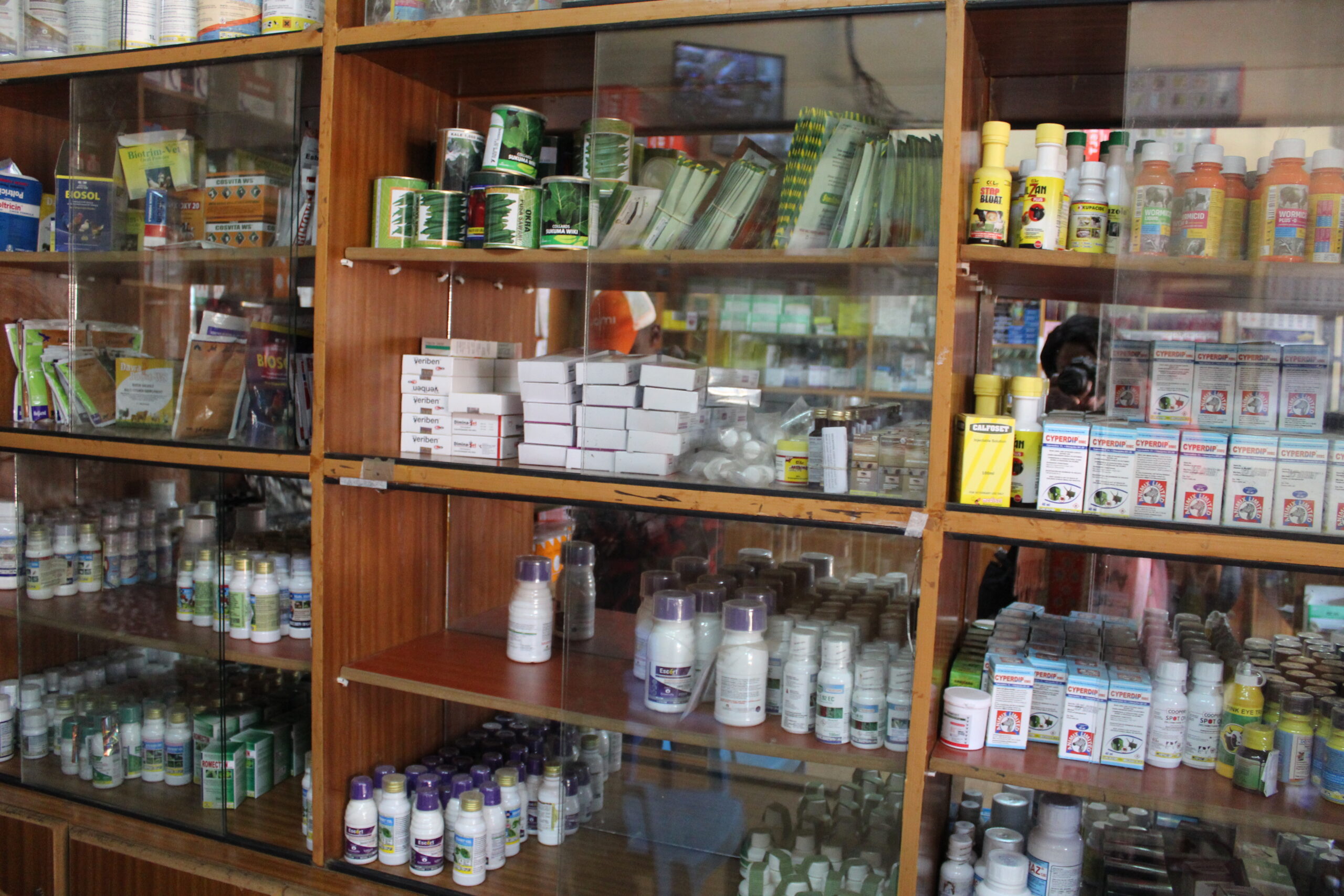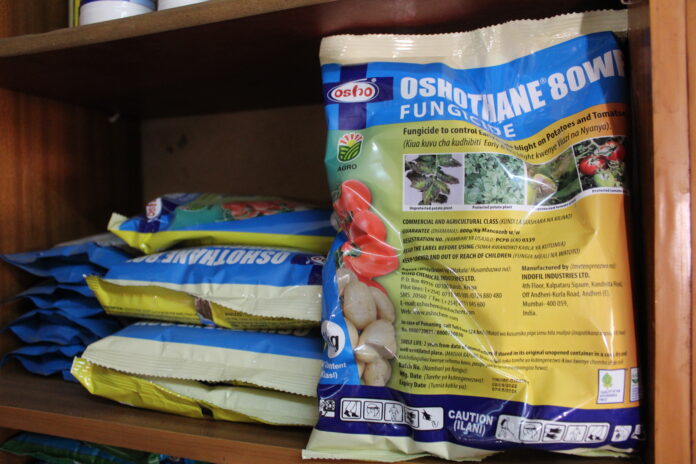By Roseleen Nzioka
Nairobi, Kenya: Food rights groups in Kenya have asked the government to urgently ban all imports of highly hazardous pesticides and phase out their current use within the country.
The call was made this week in Nairobi at the launch of a study on highly hazardous pesticides titled, “Toxic Business: Highly Hazardous Pesticides in Kenya”, and published by The Route to Food Initiative (RTFI), a program advocating for the right to food in Kenya.
What is the right to food in Kenya?
Article 43 (1) (c) of the Constitution of Kenya, 2010, on Social and Economic Rights, states that “every person has a right to be free from hunger, and to have adequate food of acceptable quality.” This naturally provides for a human rights-based approach to food security in Kenya.
The study revealed that highly hazardous pesticides (HHPs), accounted for over 75 percent of the total pesticide volume in Kenya, and nearly half were substances already banned in the European Union due to their risks to health and the environment.

The food rights group called on the Kenyan government to urgently put regulations on highly hazardous pesticides, prioritizing a list of 40 ingredients identified due to their health and environmental risks and prevalence of use.
Speaking at the launch, Julia Bleckner, senior health researcher at Human Rights Watch, among other eminent subject matter experts, said, “It should go without saying that pesticides considered too harmful for people living in Europe are equally harmful for those living in Kenya. The European Union Commission should urgently introduce promised legislation to end the double standard of exporting dangerous pesticides that are already banned for use in the EU.”
Human Rights Watch said that an Agrochemicals Association of Kenya study found that only 15 percent of farmers in Kenya wear full protective equipment when using pesticides due to the high cost, lack of availability, or climate.
Exposure to hazardous pesticides can have severe effects on the human rights to health, to adequate food, to safe drinking water, and to a healthy environment, said HRW.
The study reveals that in 2020, farmers in Kenya used a total of 310 pesticide products containing 151 active ingredients. They applied a total volume of 3,068 tonnes of pesticide products to control insects, diseases, and weeds on 26 different crops.
Out of the 310 pesticide products used, only six are biopesticides, which are primarily used for insect pest control, and one biopesticide (Trianum-P), which is used to combat fungal diseases like Fusarium. Sustainable biopesticides account for a mere 2% (47.3 t) of the total pesticide volume used in Kenya, while Highly Hazardous Pesticides (HHPs) account for 76% (2353 t).
Farmers spent $72.7 million on the purchase of pesticide products, with $28.2 million on insecticides (led by chlorpyrifos, flubendiamide, and imidacloprid), $26.4 million on herbicides (led by glyphosate and paraquat), and $18.1 million on fungicides (led by mancozeb).
Out of the 310 pesticide products used, 195 products (63%) contain one or two active ingredients that are categorized as HHPs, accounting for 76% of the total volume of pesticides used. This indicates that farmers in Kenya predominantly use HHPs, despite their known detrimental effects on human health and the environment.
Notably, almost half (44%) of the total volume of pesticides used in Kenya are already banned in Europe due to their unacceptable risk to human health and the environment.
The EU sets high food safety standards for itself and as a result, produce imported from Kenya needs to comply with set Maximum Residue Levels (MRLs) and is monitored through the European Commission’s Rapid Alert System for Food and Feed.
“The quality and safety standards of food available in Kenya’s local market should be as important, as the ones for the export market. Farmers should be encouraged to use biopesticides for the local market as well,” says the study.
The study identified the most toxic and most commonly used ingredients are the insecticide chlorpyrifos, the herbicides acetochlor, glyphosate, and 2.4-D, and the fungicides mancozeb and chlorothalonil. Considering their environmental toxicity and widespread usage, immediate regulatory action is required.
Among the top 30 pesticide products in terms of volume, the majority are highly hazardous pesticides (HHPs) as well. The top five widely used insecticides in Kenya are Marshal (carbosulfan), Thunder (beta-cyfluthrin + imidacloprid), Belt (flubendiamide), Occasion-Star (emamectin benzoate + indoxacarb), and Dursban (chlorpyrifos).
These highly hazardous insecticides cover an area of 635,350 hectares, which accounts for 21% of the total pesticide-treated area. The most heavily applied herbicides include Kalach, Touchdown Forte, Dryweed, Roundup Turbo (containing glyphosate), Herbstar, Gramoxone (containing paraquat), Lumax (containing mesotrione), HY-2.4-D, 2.4-D-Max, and Agromine (containing 2.4 D-amine).
Paraquat and 2.4 D-amine are both banned in Europe.
The most widely used fungicides are Ridomil-Gold (mancozeb/- metalaxyl-M), Nordox-Super (copper-oxide), and Milthane (containing mancozeb). Insecticidal products are generally applied in lower volumes due to their higher toxicity. Among them, Dursban (containing chlorpyrifos), which is banned in Europe, has the highest volume.
A total of 73 different companies serve as brand owners for the products used in Kenya. Chinese-owned Swiss company Syngenta leads the pesticides market with a 20% market share, followed by Bayer AG with 15%, the study reveals.
Maize, wheat, coffee, potatoes, and tomatoes in Kenya require the largest volumes of pesticides, with a heavy reliance on Highly Hazardous Pesticides. In maize and wheat production, herbicides such as 2.4-D, S-metolachlor, glyphosate, atrazine, and paraquat are primarily used.
However, the insecticide chlorpyrifos is also applied in high volumes. Coffee production uses high volumes of highly hazardous insecticides (chlorpyrifos, diazinon, omethoate, and thiophanate), fungicides (chlorothalonil), and herbicides (glyphosate, atrazine).
Potatoes and tomatoes also heavily depend on HHPs, with mancozeb being a widely used fungicide. Mancozeb is banned in the EU and has been linked to cancer. Tomato production also involves the use of a variety of highly hazardous insecticides (e.g., diazinon, thiamethoxam).
Based on their potential human health toxicity, considering factors such as carcinogenicity, reproductive toxicity, endocrine disrupting activity, mutagenicity, and neurotoxicity, several active ingredients require urgent regulatory measures, the study says.
The report made several recommendations to the Kenyan authorities requiring urgent action to prevent further devastation to human and environmental health.
Unsurprisingly, the top recommendation was the immediate action to phase out Highly Hazardous Pesticides (HHPs) following the prioritized list in the study. Other recommendations were:
- Implement Integrated Pest Management (IPM) Strategies: Prioritize the adoption of IPM strategies, especially for crops like maize, wheat, coffee, potatoes, and tomatoes. These strategies combine various pest control methods, including biological controls, crop rotation, and cultural practices, reducing reliance on synthetic pesticides.
- Promote Access to Knowledge and Information: Ensure that farmers, including women, extension officers, and Agrovet shop owners, have access to relevant information and knowledge for making informed decisions about sustainable agricultural practices, including pest and disease management.
. • Invest in Research on Biopesticides and Biocontrol Methods: Support research efforts to develop and promote biopesticides and biocontrol methods as alternatives to HHPs. Emphasize the registration process for biopesticides, giving them appropriate attention compared to hazardous pesticides.
- Ensure Affordability of Biopesticides: Make biopesticides affordable for all farmers, regardless of whether they export their products to Europe or not. This will encourage the widespread adoption of sustainable pest management practices, benefiting small-scale farmers.
- Address Corporate Accountability: Governments should hold agrochemical companies accountable by regulating and monitoring their activities, promoting transparency, and encouraging responsible practices that prioritize human health, environmental protection, and sustainable agriculture.
“The Kenyan government has in recent months taken important steps toward regulating certain harmful pesticides,” Bleckner said. “The government should build on this momentum by publishing the full results of the Pest Control Products Board review and creating stricter and more comprehensive regulations on hazardous pesticides to protect the right to adequate food and health.”
“By taking these actions, we can promote a transformation towards sustainable agriculture, embracing agroecology principles while safeguarding the right to healthy food and a healthy environment,” the study concludes.














